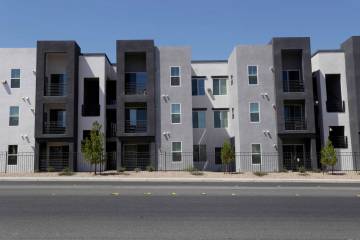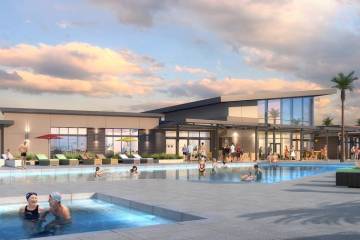
Homebuilders in Southern Nevada could face ripples, and potentially cause their own, during the Nevada 2017 legislative session in Carson City, set to begin Feb. 6.
During a gathering at Sierra Gold at 6515 S. Jones Blvd. on Jan. 11, the Southern Nevada Home Builders Association brought in Josh Hicks, a lobbyist from McDonald Carano Wilson law firm, to speak on some of the pressing matters that builders could face on the political battlefield.
Hicks warned of the potential for new taxes and how the new political powers put in place during the last election cycle could affect getting things done.
By far the most interesting initiative, however, was given by Matt Walker, the director of government affairs at the SNHBA. If plans by the association were to move forward, solar panels could be included in all new construction in the valley, and in the state of Nevada.
To foster this change, Walker said the rules on what counts as efficient building would have to be altered. Currently, some of the things that count toward energy-efficiency ratings in construction are the air conditioner, windows and insulation. But not solar power.
Earlier this year, the SNHBA presented its case to the state’s New Energy Industry Task Force — a group reactivated by Gov. Brian Sandoval to advise the administration on ways to promote and distribute renewable energy resources in Nevada.
On top of including solar as part of the efficiency rating on new home construction, the SNHBA was advocating for solar systems to be included in a home’s appraisal process.
SNHBA encouraged the use of the “green addendum” that reflects energy savings features, including solar. If implemented, this would make it easier for the buyer to purchase a property with energy-efficient systems and builders to offer them, the presentation claimed.
During the last election cycle, energy was also a big topic, with Question 3. The measure, which will be put forth to Nevada voters in 2018 to possibly pass in its second round, breaks apart NV Energy’s monopoly in the state. And it opens the door to purchasing power from other sources. Some speculate this could also increase access to renewable energy.
Overall, Hicks see energy being a big theme on the legislative floor in 2017.
Another bill that the SNHBA will likely be watching is the construction defect legislation passed in the 2015 session. Under this bill, known as the Homeowner Protections Act of 2015, the definition of what a home defect is was changed.
The legislation, Assembly Bill 125, restricted the definition of a home defect, removed attorney’s fees and costs in a home defect judgment and added a requirement for giving specific descriptions of defects. The statute of limitations for defects also was lowered from 10 years to six years, along with taking away a homeowners association’s standing to file a defect lawsuit on homes inside the community.
This change could potentially be a target by Democrats who opposed the measure in the 2015 session. Democrats could also cause issues, having gained control in all but the governership in the upcoming session.
Hicks said in the past this has created issues. When things were unbalanced, with split control — the Republicans controlled the State Senate and Democrats controlled the Assembly — there were fewer vetoes. From 2001 to 2007, there were only 11 vetoes in four sessions, according to Hicks.
During the 2011 and 2013 sessions, there were more than 40 vetoes with a Republican governor and a Democrat-controlled Assembly and Senate. That smoothed out in 2015, with Republicans back in power.
In 2017, the Democrats have seized power again. Only time will tell, but history points to some backlash.






